... AND PEACE

Anyone who is not blind to the horrors of the present day, whether in Syria, Afghanistan, Somalia or Yemen, knows that peace is still a long way off for large swathes of the world’s population. In 2021, the Heidelberg Institute for International Conflict Research identified 204 violent conflicts worldwide, including 20 all-out wars and 20 ‘limited wars’, a number of which have already been ongoing for many years. These conflicts are not always about securing global spheres of influence by military means. They often stem from unresolved local land conflicts, ethnic discrimination or unjust power structures which, fuelled by arms exports, lead to armed confrontations.
The fact that conflicts can also be resolved in non-violent ways, however, is evident from many of the latest titles to appear on the German book market. For the writer Marlene Streeruwitz, there is one particularly crucial factor. In her passionately argued Handbuch gegen den Krieg, she calls for a fundamental realignment of dominant patriarchal social structures, a radical rejection of male dominance.
Equality instead of dependency
If you look closely, it is clear that behind the escalating violence in the world today lies a dramatic increase in social inequality. Globalisation, driven by economic considerations, has brought the world closer together, but has also created deep social divides.
The book Globale Ungleichheit, edited by Karin Fischer and Margarete Grandner, provides a valuable insight into the complex causes of inequality. In many cases, racist ideologies are used to legitimise existing inequalities. These ideologies can be traced back to the days of slavery and colonialism, as Heike Raphael-Hernandez shows in her book Deutschland und die Sklaverei.
Understanding instead of isolationism
It is one of the paradoxes of our age that knowledge and action rarely go hand in hand. We know that we urgently need to change course, but we hold crisis summit after crisis summit without ever actually doing anything about it. Politicians are concerned not with tackling crises but with crisis management. The idea of promoting world peace via general economic and social development that encourages participation, which was the founding principle of the United Nations, has given way to a politics that aims first and foremost at maintaining the status quo, however unjust it may be.
It is encouraging to see authors stepping in where politics has failed, and thinking about possible solutions. Tobias Bunde and Benedikt Franke do just that in their book Die Kunst der Diplomatie, in which they not only look behind the scenes of international politics but also highlight the importance of communication based on intercultural competence.
Political solutions instead of military escalation
Wars, however, are not a tool that you can simply pick up and put down in an effort to achieve your goals. A destroyed bridge can be rebuilt, but the emotional and social damage caused by war lasts a lot longer. Defending yourself against an attacker is undoubtedly legitimate. And it is also morally right to show solidarity with the victims. Where things get more problematic is when aid and military assistance are used to compensate for a lack of political solutions. If the future of foreign policy is to be feminist, as suggested by the title of Kristina Lunz’s book Die Zukunft der Außenpolitik ist feministisch, we also need to see concrete support for women who are fighting to transform patriarchal power structures, such as in the self-governed Kurdish areas in northern Syria.
Peace is not based on military dominance but on justice, and thus on something which people all across the world, despite their cultural differences, have in common: the pursuit of a dignified life in freedom and solidarity. In his essay Die konkrete Utopie der Menschenrechte, Wolfgang Kaleck explains why we should still feel optimistic despite all the misery in the world. His book is a wonderful invitation to fight for our rights – our own rights and everyone else’s – in a reflective, self-aware way.

Handbuch gegen den Krieg / Handbook Against War
A writer takes a stand: in order to bring about peace, peace must be the model for the way we live our lives. War is the opposite of civilisation.
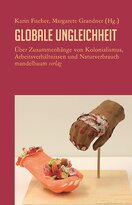
Globale Ungleichheit / Global Inequality
A book about the global context, causes and mechanisms of the unequal distribution of income, wealth and life chances.

Deutschland und die Sklaverei
‘A central and important contribution to current debates about the politics of memory.’ Bonn Center for Dependency and Slavery Studies.
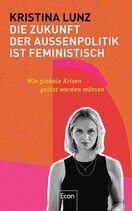
Die Zukunft der Außenpolitik ist feministisch / The Future of Foreign Policy is Feminist
‘Kristina Lunz brilliantly exposes the brutal patterns of male dominance at a global level.’ Emilia Roig.
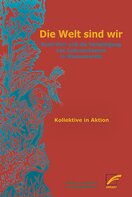
Die Welt sind wir / We are the World
The authors travelled around Mesoamerica for a year, conducting interviews and gathering experiences related to ‘living a good life’ and defending public goods.
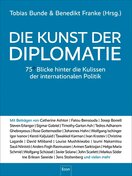
Die Kunst der Diplomatie / The Art of Diplomacy
What is diplomacy? An art, a craft? Or something in between? Experienced practitioners explore the subject.
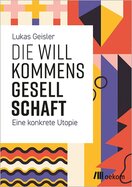
Die Willkommensgesellschaft / The Welcoming Society
Geisler shows how a humane and caring migration policy can succeed in the future, and calls on us to help create it and participate in it.
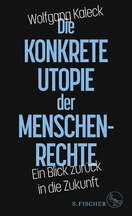
Die konkrete Utopie der Menschenrechte / The Concrete Utopia of Human Rights
As a practising lawyer in worldwide struggles, Kaleck outlines a new, concrete utopia by looking into the past and at interrelated struggles worldwide.




